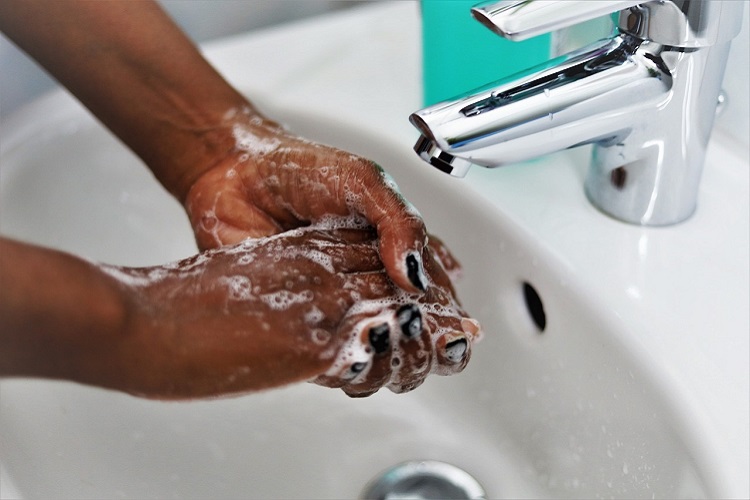Germ Defence is a behaviour change website based on scientific evidence, that gives practical advice on how to reduce the spread of infection in the home. In a randomised controlled trial – in more than 20,000 households (Little et al., 2015), using Germ Defence reduced the spread of seasonal and swine flu. It helped reduce the risk of these respiratory infections by around 14 per cent, and reduced the number of GP visits and antibiotic prescriptions needed by people who used the website. The website has now been updated for use during the coronavirus pandemic.
Researchers at the Universities of Bristol, Bath and Southampton have received funding from the UK Research and Innovation (UKRI) and National Institute for Health Research (NIHR) to understand how good Germ Defence is at reducing coronavirus infection. They will work with GP practices in England, who will be asked to send patients a special link to the Germ Defence website.
Chris Whitty, the Chief Medical Officer (CMO) for England, has made this a national priority project and it is now an NIHR Clinical Research Network (CRN) urgent public health COVID-19 portfolio study.
The coronavirus version of Germ Defence helps people understand what measures to take and when to take them to avoid infection. This includes hand washing, avoiding sharing rooms and surfaces, dealing with deliveries and ventilating rooms. Using behaviour change techniques, it helps people think through and adopt better home hygiene habits and find ways to solve any barriers.
A series of questions on the website take around 10 minutes to answer. People then get tailored advice that fits their personal circumstances, designed to help them make lasting changes. The website has been translated into more than 20 languages.

Project aim
The updated Germ Defence website could help prevent or reduce a wave of coronavirus and flu during the 2020-21 autumn and winter, as we know that coronavirus is caught in the same way as viruses like flu. Although Germ Defence has been updated for coronavirus, we don’t know whether it reduces coronavirus infections yet. The aim of this project is to test how well the new Germ Defence website works in reducing coronavirus infections.
What we will do
Half of the GP practices in England will be randomly chosen and asked to immediately send out the Germ Defence website link to their patients in the Autumn of 2020. The other half of the practices will be contacted to send out the Germ Defence website link in February 2021. The researchers will examine the effects of the Germ Defence website on rates of respiratory infection (including coronavirus and seasonal flu), and whether it reduces healthcare use (including number of GP consultations, antibiotic prescriptions, and hospital admissions) in each of the two randomly assigned groups.
GP practices will not be required to send the research team any information. After they have sent the unique website link to their patients, the researchers will know whether patients use the Germ Defence website from anonymous data produced by the website. The data will tell the research team if any patients from each practice have used the website but it will not record who these patients are.
The research team will also use anonymised NHS data, that is collected nationally as part of routine care, to compare whether infection rates and use of health care services is lower in practices that sent Germ Defence information to their patients immediately, compared to those that sent the information later.
Anticipated impacts
The previous trial showed that people who used Germ Defence advice got fewer and less severe infections, as did the people they live with. If the updated Germ Defence website helps prevent infections, including coronavirus infections, it could help save lives by reducing the spread of the virus and may reduce or prevent a wave of coronavirus and flu this autumn and winter. By reducing the number of infections and use of health care services, it could stop the NHS being overwhelmed at its busiest time.
Further information
The trial is a collaboration between the Universities of Bristol, Bath and Southampton and is being led by the NIHR Applied Research Collaboration West (NIHR ARC West).
GP practices will not be paid for taking part in the trial. But when they send the link to the Germ Defence website to their patients, this will count towards research activity for the Research Sites Initiative (RSI) scheme.
Ethics approval for the study was given by the NHS Health Research Authority, Research Ethics Committee Leeds West – Yorkshire & The Humber (REC reference: 20/YH/0261).
Funder
The project is funded by UKRI Coronavirus Rapid Response Call, NIHR ARC West and NIHR Health Protection Research Unit in Behavioural Science and Evaluation (NIHR HPRU BSE) and supported by Health Data Research UK (HDR UK) Better Care South-West Partnership and the University of Bristol’s Centre for Academic Primary Care.
Research team
University of Bristol: Jeremy Horwood, Melanie Chalder, Pippa Craggs, Sarah Denford, Rachel Denholm, Frank de Vocht, Martha Elwenspoek, John Macleod, Cathy Rice, Jonathan Sterne, Lucy Yardley. University of Bath: Ben Ainsworth. University of Southampton: James Denison-Day, Paul Little, Sascha Miller, Michael Moore, Kate Morton, Beth Stuart, Lauren Towler, Merlin Willcox, Lucy Yardley.